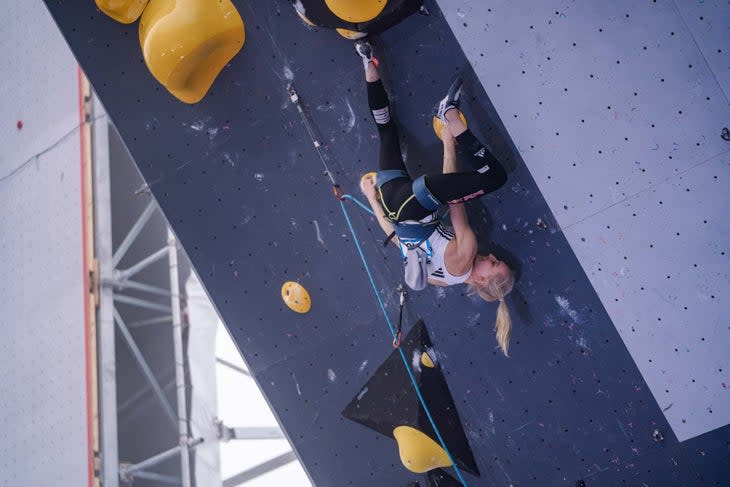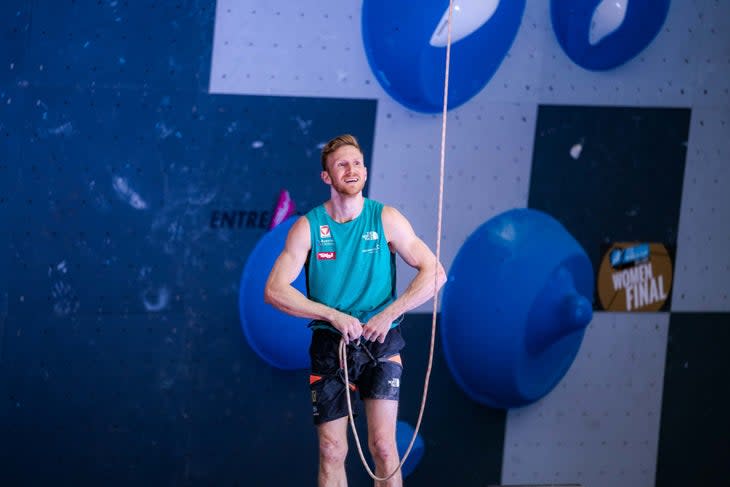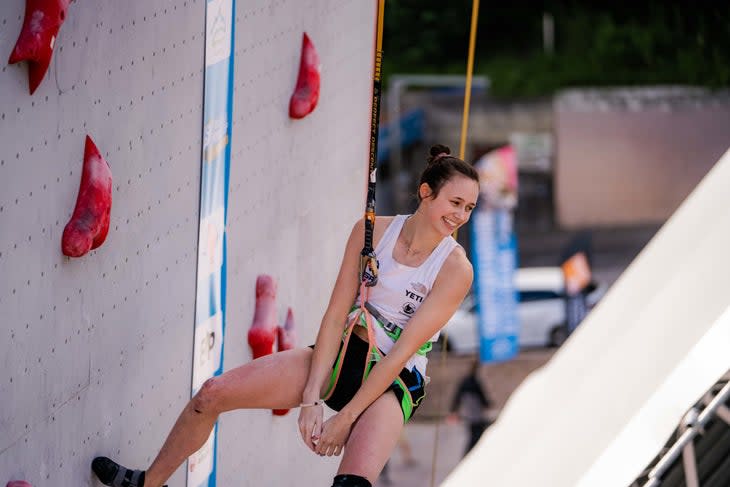Janja Garnbret Stays Perfect at Villars World Cup; Emma Hunt Surges to another American Speed Record
This article originally appeared on Climbing
It's funny to think back on the earlier portion of the 2023 World Cup season and consider how much of a non-factor Slovenia's Janja Garnbret was. Recovering from a fractured toe and subsequently absent for most of the boulder circuit, Garnbret was forced to be a sideline player while other competitors repeatedly relished in the World Cup spotlight.
The humor in such recollection comes, of course, because Garnbret has returned to become the singular biggest factor at every World Cup. She is a star in the midst of her performative and celebrity prime. Additionally, she entered this weekend's World Cup in Villars, Switzerland, undefeated in the lead discipline--having won the lead season-opener in Innsbruck, Austria, just a couple weeks ago.
But as with all World Cup proceedings, nothing was guaranteed in Villars. Surrounding Garnbret was one of the strongest World Cup rosters in recent memory. For every teenage competitor like Japan's Nonoha Kume or France's Oriane Bertone, there were decorated veterans like South Korea's Jain Kim or Helene Janicot prepared to spoil Garnbret's perfect lead season.
Here's a rundown of all the World Cup action from both the lead and speed disciplines at Villars...
Garnbret Spins
If Janja Garnbret had a counterpart in matters of fame and praise in the women's division at Villars, it was Austria's Jessica Pilz. Fresh off a spot on the podium at the Innsbruck World Cup, Pilz set a high bar in the women's rain-soaked qualification round by topping the second route. A number of other women--including Team USA's Brooke Raboutou and Natalia Grossman, and South Korea's Chaehyun Seo--managed to top one qualification route as well. But Garnbret flexed early by being the only woman to reach the top of both qualification routes. In doing so, Garnbret set her personal thematic standard, which would remain for the rest of the event: Tops, tops, tops.

The aforementioned Helene Janicot of France, who has returned to the World Cup circuit after pseudo-retirement, cruised to an early high point in the women's semi-final round. Janicot ultimately fell as she attempted to readjust her matched hands near the headwall, but her beefy score of 34 remained the pinnacle for a long time--until Japan's Natsuki Tanii was able to crimp over the lip of the headwall and establish a better score of 40+. Team USA's Grossman and Austria's Pilz weren't able to surpass that new high point in the semi-finals. In fact, only South Korea's Seo and Team USA's Raboutou crimped higher on the headwall, as each eventually fell at a cruxy dyno near the top of the route. But Garnbret, climbing last, kept to her personal theme, crunched through the headwall's crimps and landed the dyno for the only top of the round.
Pilz, undaunted, kept the pressure on in the finals. She perfectly executed the route's lower crux, a dyno off a green sloper. Then she continued climbing onto the headwall, where she worked through a section of delicate footholds and thumby pinches. With her time ticking down, she fell while attempting a press-and-reach move--ostensibly the route's upper crux--but not before embossing a great score of 43+.
Successive competitors were soon stymied by the various cruxes. South Korea's Jain Kim, for example, fell shortly after landing the green-sloper dyno (with a final score of 22+). Slovenia's Mia Krampl was able to enter the headwall and even did a 360-spin--the intended beta--on the delicate footholds, but her foot popped as she reached for the 41st handhold. South Korea's Seo fell just shy of that high point set by Pilz; Seo was never able to establish much of a press-and-reach pose from an awkward squat on a scoop-shaped volume. Raboutou, climbing as fluidly as ever, unfortunately timed out on the same scoop-shaped volume.
Just as it started to seem like the route might have too many cruxes, Garnbret came out and breezed through the low dyno. Then she cranked on the crimps to reach the headwall and wowed the crowd with the intended 360-spin beta. She made quick work of the awkward squat on the scoop-shaped volume too, pressing and reaching up for a large sloper and, finally, dynoing for the only top of the round. In doing so, Garnbret won the gold (bolstered by having topped every route in every round); Pilz earned the silver, and Raboutou earned the bronze.
Veterans Shine
The earliest intrigue in the men's division was not due to a singular standout superstar, but due to a makeshift duel that quickly emerged between veterans Adam Ondra and Jakob Schubert. The two stalwarts of the circuit (Schubert being 32 years old and Ondra being 30) were close in the scores throughout the qualification round, and they remained adjacent to each other on the semi-finals' scorecards too.
Even so, other--younger--competitors took turns in the semi-finals' spotlight. 19-year-old Colin Duffy of Team USA was the first competitor to find firm footing near the lip of the headwall and motor to the top of the route. Shortly thereafter, 16-year old Sorato Anraku of Japan topped the semi-finals route as well. Unsuccessful attempts on a tricky dyno, lower on the headwall, drew attention to even more competitors, such as Germany's Alex Megos and Great Britain's Toby Roberts.
Most importantly, all the highlights funneled into a dramatic final round. China's Yufei Pan set the early high point (of 34); he fell midway up the finals' route as he tried to flick his right hand from a crimp to a pinch. Germany's Megos seemed unfazed by the hand-flick sequence and rocketed to a much higher position before falling after securing a red dual-tex sloper (hold 40). Schubert was also able to latch onto that red sloper--and gritted through two more moves before dry-firing with a leading score of 42+.

Ondra had a chance to steal the show, and with it, win the gold medal. During his climb, he successfully gripped the red dual-tex sloper on the headwall too--thus surpassing Megos on the scorecards. But taking flight in a controlled leap, Ondra failed to latch onto the 42nd hold. The final two competitors, Colin Duffy and Sorato Anraku--couldn't exceed Schubert's high mark either, so the podium of veterans was confirmed: Schubert took home the gold medal; Ondra earned the bronze, and Megos earned the silver.
Speed Stumbles
The world record holder in the women's speed division, Poland's Aleksandra Miroslaw, has traditionally been very choosy about which World Cups she participates in. Her absence from Villars allowed her teammates, Natalia and Aleksandra Kalucka, to carry the banner for Poland and, in doing so, set a high bar on their own. To that point, the Kalucka sisters amassed some of the fastest times of the women's qualification round--a run of 6.55 seconds for Natalia, and a run of 6.82 for Aleksandra, in particular. But Poland wasn't the only country with standout performances. Team USA's Emma Hunt clocked a time (6.68 seconds) that positioned her between the Kalucka sisters in the qualification results; more notably for American fans, that time equated to another U.S. record for Hunt, bettering her own previous record by 0.11 seconds.
As expected, Natalia Kalucka and Emma Hunt raced to victory in their respective races during the resultant 1/8 final too. But a surprising result came when Aleksandra Kalucka stumbled on a run and lost to Italy's Beatrice Colli. An additional subplot emerged when China's Lijuan Deng began clocking the fastest times of the finals, epitomized by a high-octane race (and a time of 6.53 seconds) against Indonesia's Desak Made Rita Kusuma Dewi.

The elimination bracket eventually funneled into a 1/2 final race between China's Deng and Poland's Natalia Kalucka. Deng bolted to an early lead--aided by a right-foot bobble from Kalucka--but Kalucka was able to come from behind and smack the buzzer with a winning time of 6.45 seconds. This ultimately set up a big final race between Natalia Kalucka and Emma Hunt. The race started smoothly, but a costly left-foot slip from Hunt allowed Kalucka to coast to a gold medal. Hunt was awarded the silver, while Deng outsprinted Italy's Colli for the bronze in the small final race.
The country that stood out most in the men's speed division was China. Although Indonesia's Veddriq Leonardo had the single fastest time in the qualification round (4.97 seconds), nearly half of the Top 10 fastest qualification times belonged to competitors from the Chinese team.
It appeared like Leonardo would remain the person to beat, but he had a strange and uncharacteristic journey in the finals: A default victory in the 1/8 final when Spain's Erik Noya Cardona false started, and then a calamitous right-foot slip in the 1/4 final that resulted in a loss to China's Liang Zhang.
Leonardo's shocking exit from the tournament bracket opened the figurative door even more for Team China; Jianguo Long, arguably China's fastest competitor, edged out compatriot Long Cao in a back-and-forth race that ended up being the most exciting of the entire round. Soon, the only other countries that remained in contention to challenge China were Japan (on the shoulders of 21-year-old Ryo Omasa) and the USA (bolstered by 16-year-old phenom Sam Watson). However, false starts in the 1/2 final from both Omasa and Watson stalled the momentum of each competitor. The conclusion to all the drama came in a big final matchup, in which China's Jianguo Long beat teammate Zhang for the gold medal. It wasn't the most thrilling climax, as Zhang slipped and did not finish the race (but still came away with the silver medal). Still, the pairing aptly showcased China's speed depth--sure to be an ongoing plot point in the upcoming World Championships and the Olympic qualification pathway. Japan's Omasa, who suffered a calf injury midway through the final round, was able to rally enough to beat Watson in a small final race for the bronze.
Other Thoughts
Of all the great speed matchups, the one that excited me most was Peng Wu vs. Sam Watson, specifically because there was only a 0.01-second difference in their personal best times (5.02 seconds for Watson, 5.01 for Wu). The race didn't disappoint, with Watson eventually edging out the victory by just...well, 0.01 seconds.
This was Emma Hunt's first World Cup podium of the 2023 season--and she looked to be in optimal form throughout all rounds: Laser-focused and psyched, but also calm and composed. She didn't win the gold medal, but one could make an argument that this weekend in Villars was her finest performance yet.
It feels necessary to give some historical context to everything Janja Garnbret does these days, as she is continually adding to her own historical legacy. So, consider that this event marked her seventh consecutive win in Villars. Season-wise, that lineage goes all the way back to 2016. Let that sink in.
Let's take a moment to celebrate the greatness of Brooke Raboutou's 2023 season so far. Combining lead and boulder results, Raboutou has participated in a total of six World Cup events and made podium at four of them. Furthermore, in the two events where she did not make podium, she finished in fourth place--barely out of medal position.
There was room for questioning whether Chaehyun Seo deserved a score of 43+ instead of 43 in the women's final round. In fact, earning that "+" would have bumped Seo onto the podium. She certainly fought for what seemed like ages in that squatted position on the blue scoop-shaped volume, but she never really made any upward motion, let alone any upward progress to reach for the next hold. I think the right call was made: A score of 43, no more.
Japan's Miho Nonaka got one of her qualification scores downgraded because it was determined that she stepped on a bolt. This ruling essentially wrecked Nonaka's chances of success (or advancement). I echo commentator Matt Groom's exasperated sentiment: It's 2023--bolt covers exist, so why not just cover all bolts?
I had high expectations for Team USA's Jesse Grupper, as he was a silver medalist in Villars last year. So, it was a major bummer that he fell so low (23+) this year on the men's semi-finals route and finished in 22nd place. Malek Taleb on commentary made a good point though: The semi-finals route was sort of Grupper's anti-style, with a lot of open-hand grips and not many small crimps on which Grupper could bear down. Suffice to say, we're two events into the lead season and we haven't seen anything close to a prime Jesse Grupper performance yet.
I'd like to believe that South Korea's Jain Kim can still win a World Cup. Her story is inspiring--she retired as an all-time great, had a child, and has now returned to the circuit at age 34. But it seems like her ultra-methodical pace (which, granted, is enjoyable to watch) might be a bit antiquated on today's coordination routes. Additionally, every dynamic move seems to be something of a gamble for Kim (evidenced by her fall shortly after the dyno in these finals). Still, the statistics don't lie: Kim's results have improved at every lead World Cup so far this season, so maybe she'll find that ol' gold medal magic again someday.
Results
Lead
Women
Janja Garnbret (SLO)
Jessica Pilz (AUT)
Brooke Raboutou (USA)
Chaehyun Seo (KOR)
Mia Krampl (SLO)
Natsuki Tanii (JPN)
Jain Kim (KOR)
Mattea Potzi (AUT)
Men
Jakob Schubert (AUT)
Adam Ondra (CZE)
Alex Megos (GER)
Toby Roberts (GBR)
Colin Duffy (USA)
Sorato Anraku (JPN)
Yufei Pain (CHN)
Shion Omata (JPN)
Speed
Women
Natalia Kalucka (POL)
Emma Hunt (USA)
Lijuan Deng (CHN)
Men
Jianguo Long (CHN)
Liang Zhang (CHN)
Ryo Omasa (JPN)
Also Read
For exclusive access to all of our fitness, gear, adventure, and travel stories, plus discounts on trips, events, and gear, sign up for Outside+ today.

